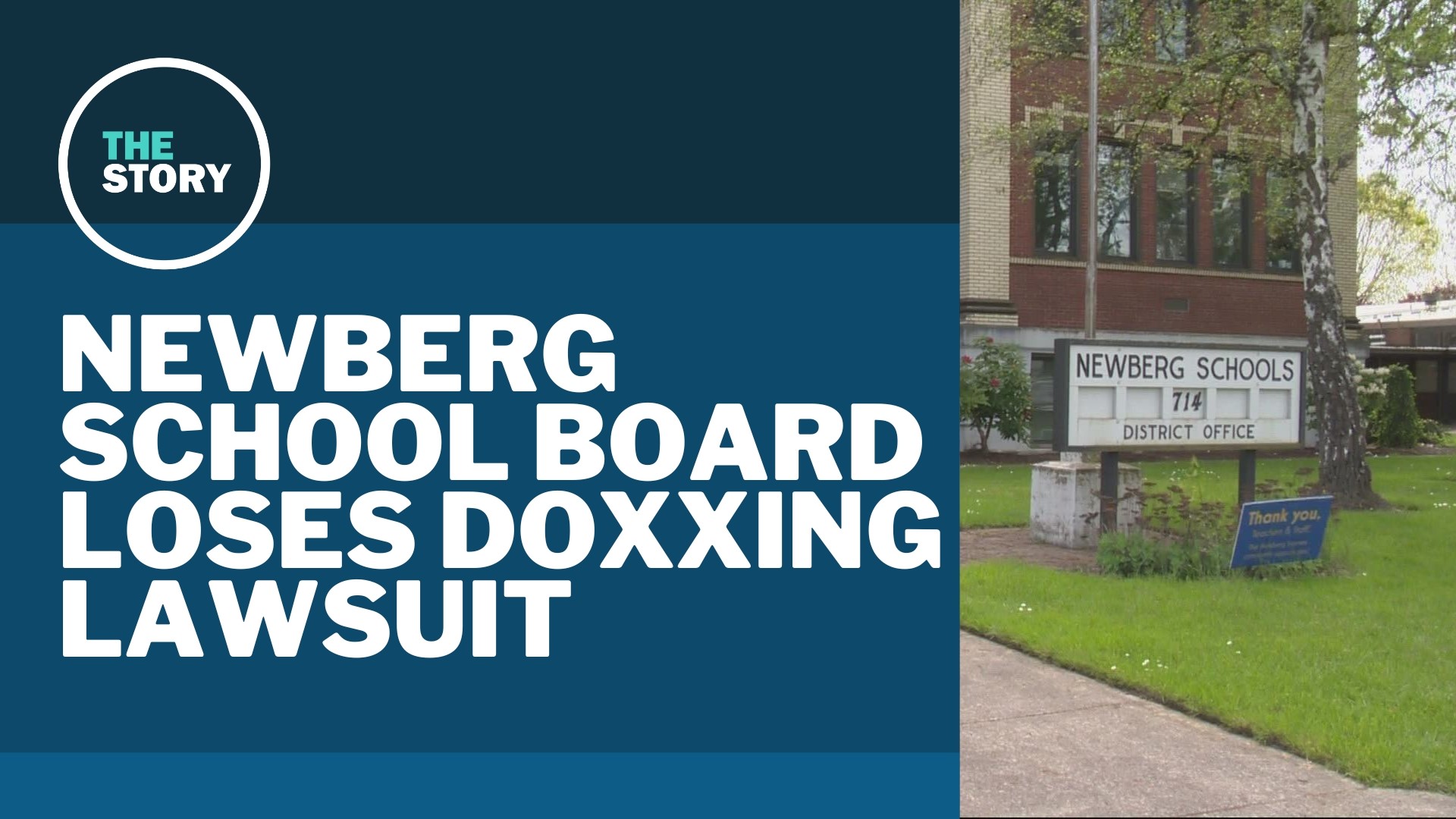SALEM, Ore. — A recent Oregon law against "doxxing" just got one of its first big tests, and the case stems from a place that will likely be familiar to Portland-area residents: a Newberg School Board controversy.
Doxxing refers to when someone releases another person's personal information in a targeted and public way — usually online. But earlier this month, the Oregon Supreme Court ruled that when it comes to elected officials, the bar for what can be considered doxxing is pretty high — and that didn't apply to the school board members.
In 2021, the Newberg school board's conservative majority passed a ban on LGBTQ+ Pride and Black Lives Matter displays on school grounds — later amended to be a ban on anything deemed "political" or "controversial." The ban was later ruled unconstitutional, and two of the four board members who voted for it were voted out of their jobs in the last election.
But before that happened, the rule was the subject of intense debate, protests and several lawsuits.
The 'doxxing' accusations
Most of the lawsuits were filed against the board members or school district by teachers, parents or groups like the ACLU, but one lawsuit was the reverse; it was filed by the four conservative board members against a group of parents, alleging that the parents had doxxed them.
The parents were members of a private Facebook group created after the political symbols ban passed. Four of the parents posted information about the board members' employers:
- School Board Chair Dave Brown worked as a girl's tennis coach in the Canby School District. One parent posted the district athletic director's name, as well as their work phone number and email.
- Board members Trevor Dehart and Brian Shannon each worked for technology companies. Two parents posted their employers' websites and bosses' phone numbers.
- Another board member, Renee Rowell, had her artwork removed from a local vineyard after a parent in the private Facebook group contacted them.
Those incidents spurred the four school board members to file the suit.
What is Oregon's anti-doxxing law?
Passed in 2021, House Bill 3047 prohibits the public release of personal information if the release of that information is for the purpose of harassing or harming the person, as well as if a reasonable person in the same position would suffer severe emotional distress due to the release.
Personal information includes home addresses, personal emails, personal phone numbers, Social Security numbers, photos of a person's children, family members' contact information and employers' contact information.
The initial lower-court victory
Initially, the board members won their lawsuit in a lower court in Yamhill County, each telling the judge that they were anxious about going out in public in Newberg and that they felt unsafe at home. They all said that their relationships with their bosses had changed, with Brian Shannon saying he even lost his job.
The Yamhill County judge wrote that it is problematic for members of the public to use information that could embarrass or motivate a public official to change their position.
The judge continued, stating that the school board members' private jobs didn't have any bearing on their school board role, writing, "It's unclear why employment or the values of those private entities would be a matter of public interest."
School board members refuted
But the parents appealed that ruling up to the state court of appeals, arguing that the information they had shared was already public. They pointed out that the board members even released that information themselves — it had all been found on their own campaign websites, public LinkedIn pages or quotes they had given to local newspapers or other public places.
The parents also argued that the lawsuit violated Oregon's anti-SLAPP law. SLAPP stands for "strategic lawsuits against public participation" — the lawsuits in question are meant to scare people off from participating in politics or public affairs. The anti-SLAPP law is meant to protect free speech when it comes to matters that are important to the public.
The Oregon Court of Appeals ruled that the anti-SLAPP law did indeed protect parents, and reversed the Yamhill County Court's ruling, saying the parents were exercising free speech connected to a public issue or an issue of public interest.
The court also noted that the type of information posted would be less likely to cause severe emotional distress than, for example, posting pictures of the board members' children, home addresses, or names of the schools their children attend.
The court added that the school board members were making decisions with the political symbols ban that affected a large number of people, and as elected officials, part of the job is to experience the consequences of those decisions with the public.
The court quoted the U.S. Supreme Court, writing, "An individual who decides to seek governmental office must accept certain necessary consequences of that involvement in public affairs, including that the individual runs the risk of closer public scrutiny than might otherwise be the case."
In short? It's legal for a person to threaten to socially ostracize or vilify a public official if they do something the person doesn't like — that's the "high bar" for doxxing politicians.
The Oregon Supreme Court also agreed that since the board members released the information themselves, that information was not considered personal.
The justices added that although they believe the board members experienced anxiety while out in public, none of the board members could prove that they'd actually been harmed, and according to the anti-doxxing law, it's not enough that the information was released — the school board members had to prove they were harassed or harmed by its release.

